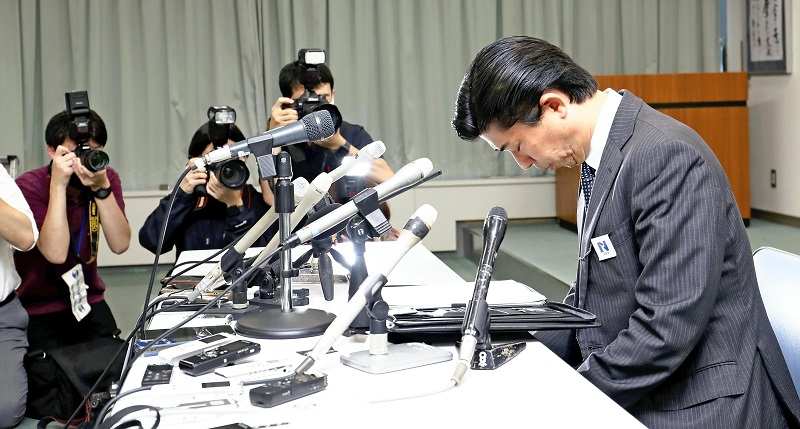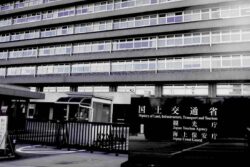Lessons for dignitary protection: Police, safety commission slow in dealing with Abe shooting

Nara prefectural police Chief Tomoaki Onizuka bows during a press conference on July 9 in Nara City.
The Yomiuri Shimbun
6:00 JST, July 28, 2022
In the aftermath of the fatal shooting of former Prime Minister Shinzo Abe, questions have arisen about the security detail protecting him. This is the final installment in a three-part series exploring problems with Japan’s dignitary protection.
※※※
News of the traumatic fatal shooting of former Prime Minister Shinzo Abe, widely known abroad as one of the faces of Japan, quickly spread around the world. Spreading just as fast has been this question: “What kind of security measures were being taken at that time?”
It was only on July 12, however, four days after the incident, when the chairperson of the National Public Safety Commission, a Cabinet post, held his first press conference on the issue.
“I have instructed the National Police Agency to look into the protection,” said Satoshi Ninoyu. Not only was he making his first comments on the murder a handful of days after it happened, but this was also a regularly scheduled press conference after a Cabinet meeting.
Regarding the police response, only the head of the investigation department at the Nara prefectural police and others held a press conference on the day of the incident. They only said they would proceed to confirm the status of the protection.
The following day, the Nara prefectural police chief admitted that there had been a problem with the protection and security for Abe.
A former senior police official criticized such police reaction, saying: “This was an unprecedented incident. A minister-level press conference should have been held earlier to achieve police accountability.”
There have been similar examples in the past. In June 1975, at the state funeral for former Prime Minister Eisaku Sato at the Nippon Budokan in Tokyo, then Prime Minister Takeo Miki was attacked and injured by a right-winger. Then National Public Safety Commission Chairperson Hajime Fukuda held a press conference four hours after it occurred.
“I called the NPA commissioner general and other senior officials and instructed them to clarify where the responsibility lies,” Fukuda said at that press conference. “I’m sincerely sorry about [the incident].”
After Abe was killed, The Yomiuri Shimbun asked all five National Public Safety Commissioners in writing, via the NPA, about their perceptions of the incident, but none of them responded.
“As a council system is in place,” an NPA official in charge said, “each commissioner is not available to individually answer the media.”
Hajime Ota, a professor of organizational theory at Doshisha University, said, “The National Public Safety Commission needs to make transparent how it manages the police and clarify, along with the police, where the responsibility lies for this incident.”
Expanding use of SP
One of the pillars on future review of dignitary protection will be countermeasures against firearms. After the 1992 attempt to shoot then Liberal Democratic Party Vice President Shin Kanemaru in Tochigi Prefecture, the police strengthened training against firearms. Still, the police continue to focus on precautions against knife attacks as they consider the situation in Japan as different from the United States and other countries with a culture of gun ownership.
However, the suspect in Abe’s killing, Tetsuya Yamagami, gained information on how to make guns and gunpowder on the internet and used readily available materials to make firearms. The fact anyone can obtain guns has become obvious, making it essential to strengthen countermeasures against firearms.
Another key point is to expand the use of the Metropolitan Police Department’s security police (SP) to accompany politicians when stumping in regional cities and towns. Prefectural police are responsible for providing on-site protection, but areas where dignitaries rarely visit are likely to have holes in their protection due to a lack of experience.
“Increasing the number of SP dispatched to regional areas will be a topic for discussion,” a senior police official said.
The NPA’s involvement in dignitary protection is also being questioned. Until now, the NPA has not checked security plans for former prime ministers. Is such a stance acceptable? Shouldn’t the central government take the lead in protecting dignitaries? There are many points that need to be discussed.
The Imperial Household Agency is taking the Abe incident very seriously. The Imperial family values contact with people when they make visits, but such communication might put their lives at risk.
“We can say that it is an eternal challenge how to ensure the safety of Imperial family members without disturbing rapport with the people,” Yasuhiko Nishimura, grand steward of the agency and a former senior police officer, said at a press conference on July 14.
At a meeting of the LDP’s Research Commission on Public Safety and Counter-Terrorism on July 20, a participant said that training on the part of dignitaries was also needed.
“It’s imperative that we make sure we are also fully prepared,” added Sanae Takaichi, chairperson of the LDP Policy Research Council.
Japan is facing a critical moment. Can the relevant organizations work together to take drastic measures to better protect dignitaries?
Most Read
Popular articles in the past 24 hours
-

Japan, U.S. Name 3 Inaugural Investment Projects; Reached Agreeme...
-

3 Brazilians Arrested for Stealing Toyota Land Cruiser; Trio Also...
-

Special Diet Session to Consider Budget, Proposed National Intell...
-

Security Services Law Unconstitutional: Do Not Restrict Career Ch...
-

Milano Cortina 2026: Japan’s Kaori Sakamoto Wins Silver; Ami Naka...
-

New Leader of Japan's CRA Opposition Party Faces Challenge of For...
-

Japan to Ban Use of Power Banks on Airplanes
-

Tokyo Exhibition Featuring VR Walk Through 2025 Osaka-Kansai Expo...
Popular articles in the past week
-

Japan PM Takaichi’s Cabinet Resigns en Masse
-

Man Infected with Measles Reportedly Dined at Restaurant in Tokyo...
-

Videos Plagiarized, Reposted with False Subtitles Claiming ‘Ryuky...
-

Sanae Takaichi Elected 105th Prime Minister of Japan; Keeps All C...
-

Japan's Govt to Submit Road Map for Growth Strategy in March, PM ...
-

Milano Cortina 2026: Figure Skaters Riku Miura, Ryuichi Kihara Pa...
-

Bus Carrying 40 Passengers Catches Fire on Chuo Expressway; All E...
-

Tokyo’s New Record-Breaking Fountain Named ‘Tokyo Aqua Symphony’
Popular articles in the past month
-

Japan PM Takaichi’s Cabinet Resigns en Masse
-

Japan Institute to Use Domestic Commercial Optical Lattice Clock ...
-

Israeli Ambassador to Japan Speaks about Japan’s Role in the Reco...
-

Man Infected with Measles Reportedly Dined at Restaurant in Tokyo...
-

Man Infected with Measles May Have Come in Contact with Many Peop...
-

Videos Plagiarized, Reposted with False Subtitles Claiming ‘Ryuky...
-

Prudential Life Insurance Plans to Fully Compensate for Damages C...
-

Woman with Measles Visited Hospital in Tokyo Multiple Times Befor...
Top Articles in Society
-

Man Infected with Measles Reportedly Dined at Restaurant in Tokyo Station
-

Man Infected with Measles May Have Come in Contact with Many People in Tokyo, Went to Store, Restaurant Around When Symptoms Emerged
-

Woman with Measles Visited Hospital in Tokyo Multiple Times Before Being Diagnosed with Disease
-

Australian Woman Dies After Mishap on Ski Lift in Nagano Prefecture
-

Foreign Snowboarder in Serious Condition After Hanging in Midair from Chairlift in Nagano Prefecture
JN ACCESS RANKING
-

Japan PM Takaichi’s Cabinet Resigns en Masse
-

Japan Institute to Use Domestic Commercial Optical Lattice Clock to Set Japan Standard Time
-

Israeli Ambassador to Japan Speaks about Japan’s Role in the Reconstruction of Gaza
-

Man Infected with Measles Reportedly Dined at Restaurant in Tokyo Station
-

Man Infected with Measles May Have Come in Contact with Many People in Tokyo, Went to Store, Restaurant Around When Symptoms Emerged








